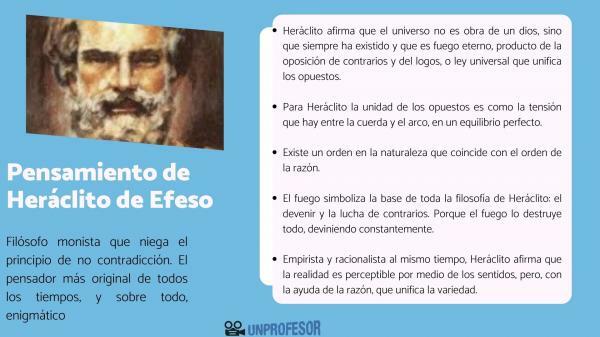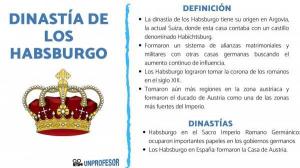Heraclitus thought of EPHESUS

In this lesson from a TEACHER we offer you a brief summary of the thought of Heraclitus of Ephesus, "The dark one", as he was known. Of this philosopher born in Ephesus (Ionia) only fragments of his work are preserved "About Nature”, A book just as confusing as its author and which basically consisted of a compilation of sentences and hypotheses. His life has survived to this day, thanks to the work of Diogenes Laertius, “Life and Sentences of Illustrious Philosophers"And according to account, he was a very mysterious man and little friend of social gatherings. In fact, he led the life of a hermit.
Philosopher monistic what denies the principle of non-contradiction. The most original thinker of all time, and above all, enigmatic. If you want to know more about the thought of Heraclitus of Ephesus, keep reading this article by a TEACHER.
Index
- The change in thought of Heraclitus of Ephesus
- Opposition of opposites
- A universal law, the Logos
- Fire, the basis of becoming and the fight of opposites
The change in thinking of Heraclitus of Ephesus.
Heraclitus affirms that the universe is not the work of a god, but that it has always existed and that it is eternal fire, product of opposition of opposites and from logos, or universal law that unifies the opposites.
Change, becoming, is the basis of his philosophy. "Everything flows" (Panta rei). There is in nature a universal flow between all beings. And the conflict, the contradiction, is what makes the change possible. Because, says the thinker, “War is the father of all things”. The conflict, at the same time, serves as a bridge of union, in that tension or balance of opposing forces.
Everyone knows his famous phrase: "In the same rivers we enter and do not enter, (well) we are and we are not (the same)”. The river, and the people who bathe, have changed, they are no longer the same. But there is something that does remain, and it is the channel, which is always the same.
Although it seems contradictory, it is not, since, according to Heraclitus, there is no contradiction in opposites, but a harmony in motion.
“The sun is new every day”.

The opposition of the opposites.
Consists of the tension or war between the elements, governed by universal law, the Logos.
"There is harmony in the back bending as in the bow and the lyre."
For Heraclitus, the unity of opposites is like the tension between the string and the bow, in perfect balance. The logos unifies the opposites because knowing is "one and one thing”. Thus being and not being, are at the same time. The conflict creates a harmony that can be observed in nature and in human beings: man / woman, light / dark, heat / cold ...
Reality is one and it is multiple, because the becoming it is the essence of everything there is. There is a Unit, but this is based on the difference.
“¡I wish the discord between gods and men would be extinguished! ”, Said the poet, to which Heraclitus replied:“For there would be no harmony if there were no acute and grave, nor animals if there were no female and male, which are in mutual opposition "

A universal law, the Logos.
According to the thought of Heraclitus of Ephesus, the universe is governed by universal law or Logos, understood as a word or reason. The Logos directs the becoming, with the word, but the great part of the people, says Heraclitus, “nor he knows how to listen or speakr”.
There is order in nature that matches the order of reason. For the thinker, there is a harmony in nature, but few can see it, since nature hides. But the problem is not in their invisibility, but in the blindness or deafness of people, which does not allow them to perceive what is real.
Empiricist Y rationalist at the same time, Heraclitus affirms that reality is perceptible through the senses, but, with the help of reason, that unifies the variety. The logos or reason, are inside each human being, in his soul, and it depends on him to listen to it.

Fire, the basis of becoming and the fight of opposites.
“Fire, coming, will judge and condemn all things”
We finish this review of the thought of Heraclitus of Ephesus by talking about fire, which symbolizes the basis of the entire philosophy of Heraclitus: the becoming and the struggle of opposites. Because fire destroys everything, constantly becoming.
Fire symbolizes change, and he compares it with God, in opposition to the human being, to the mortal, to the divine. It must be borne in mind that Heraclitus does not speak of a creator God or a prime mover, but rather identifies God with nature (pantheism).
The cosmos is "an eternal fire" that destroys everything. The universe is born and dies in fire. Becoming is the creator and destroyer of the world. And extinction, is according to Heraclitus, a “way down”. Now, becoming is not irrational, since the Logos, universal reason, governs it:
“Everything arises according to measure and according to measure it is extinguished... is he way up”.
If you want to read more articles similar to Thought of Heraclitus of Ephesus: summary, we recommend that you enter our category of Philosophy.
Bibliography
Laercio, D. Lives, ORpinions and I knowintents of the Fmore philosophers Ilusters. Ed. Maxtor. 2008



